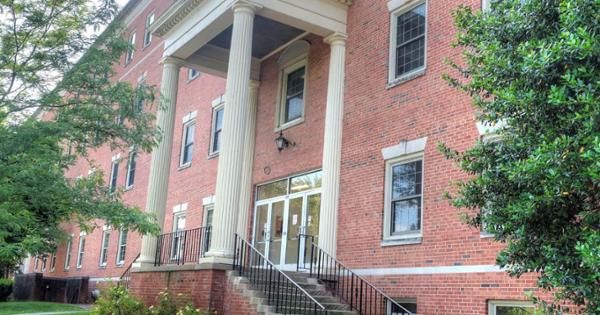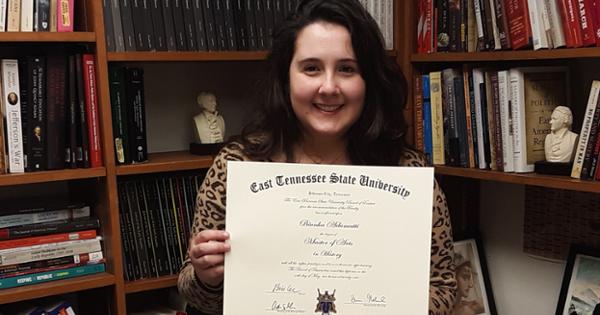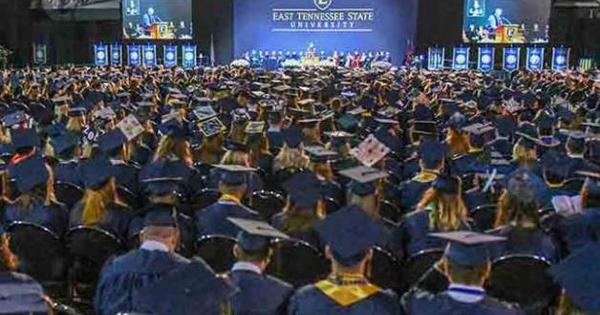Master of Arts in History
Thank you for taking an interest in earning an MA in History at ETSU! Our Program helps students earn a degree in two years while they enjoy a variety of scholarly activities, innovative courses, and professional experiences on a vibrant campus. Program graduates have entered doctoral programs, academia, public history, government, and the private sector. See links below for admission requirements, application deadlines, funding, faculty fields, and other program features. If you qualify, click "Apply Now." Attend a VIS or contact mayobobee@etsu.edu. Consider our Graduate Certificate, Online Certificate and ETSU's ABM Program.
-
Admission Requirements
Minimum Requirements for Admission
- A bachelor's degree from an accredited institution.
Successful completion of a minimum of 27 credit-hours of history courses. - At least a 3.0 grade point average in upper-level history courses.
- Three letters of recommendation from three (3) undergraduate instructors (preferably History).
- An application essay (personal statement) of 250-300 words which addresses the specific fields of history you wish to study in the graduate program.
- At this time the Graduate Committee does not require submission of GRE scores.
- The MA Program does not require demonstrated ability in a foreign language. However, those students hoping to conduct thesis research in languages other than English need to notify the Graduate Coordinator. (Approved foreign language courses do not count toward completion of the MA in History).
The Graduate Committee places great emphasis on your undergraduate transcripts, letters of reference, and personal statement. It is important that you complete your statement carefully, paying close attention to standards for formal written English. A strong personal statement will tell the committee why you wish to come to ETSU, what you hope to accomplish by earning an MA in history, and if you have identified members of the Department of History faculty with whom you hope to work. If possible, the personal statement should also include the fields of history you plan pursue after enrollment in our MA Program.
- A bachelor's degree from an accredited institution.
-
Degree Options (Thesis, Non-Thesis, and Part-Time)
Thesis Option
Required courses
History 5950 Introduction to Research (Fall Semesters Only)
History 5940 Historiography (Spring Semester Only)
Students choosing this option complete 30 credits of coursework and write a thesis. The culminating event for thesis students is a thesis defense. Below is a general outline of credit hours for each semester. See matriculation limit at end of list.- First Semester (9 credits): HIST 5950 Intro to Research (Fall Semester) and two graduate seminars.
- Second Semester (9 credits): HIST 5940 Historiography (Spring Semester) and two graduate seminars. Select a thesis committee (Usually three professors with whom you have previously taken courses in the graduate program).
- Third Semester (6 credits): Two seminars plus HIST 5990 Reading & Research. This schedule will get you to 9 credits and eligibility for a GA or TS. Federal Financial Aid (student loans) requires 6 credits that count toward the degree. HIST 5990 does not count toward degree completion - it is not part of our degree program - but the remaining 6-credits will count toward program completion (and an FSFA Loan).
- Fourth Semester (6 credits): One seminar and HIST 5960 (thesis). GA/TS students only need six credits in their final semester to remain eligible, and both the thesis course and one other class are necessary to complete the 30 credit requirement. You are still considered full-time. Culminating Event: Thesis Defense.
Non-Thesis or "Coursework" Option
Required courses
History 5950 Introduction to Research (Fall Semesters Only)
History 5940 Historiography (Spring Semesters Only)Students not writing a thesis complete 39 credits of coursework. The culminating event for non-thesis students is a Comprehensive Exam (written and oral). Below is a general outline of credit hours for each semester. See matriculation limit at end of list.
- First Semester (9 credits): HIST 5950 Intro to Research (Fall semester) and two graduate seminars.
- Second Semester (9 credits): HIST 5940 Historiography (Spring Semester) and two other courses.
- Third Semester (9 or 12 credits): Three or four graduate seminars. Select a Comprehensive Exam Committee of three professors and submit the committee list - with their permission - to the professor who agrees to be your Exam Committee Chair.
- Fourth Semester (9 or 12 credits): Three or four graduate seminars, Culminating Event: Comprehensive Exam in three areas of history (Written and Oral)
*For non-thesis students the 12-credit semester can be any semester although it is usually the last one.
GA and Half-GA recipients must enroll in one of the online, one-credit professional development courses each semester. These courses are funded by the Graduate School and do not count toward completion of the MA in History Program:
HIST 5019-900 - Supervised Teaching
HIST 5029-900 - Supervised Research
HIST 5039-900 - Supervised AdministrationPart-Time Students
We understand that circumstances differ from person to person, and that not all prospective graduate students can pursue a degree full-time. The History Department allows students to enroll part-time. See matriculation limit at end of list.
Required courses
History 5950 Introduction to Research (Fall Semesters Only)
History 5940 Historiography (Spring Semesters Only)Part-time graduate students are ineligible for departmental funding, and must still complete the program within six years of the date of enrollment. The number of credits a part-time student must complete are contingent on whether they choose a thesis (30-credits) or non-thesis (39-credits) track. Part-time students are also required to successfully complete the appropriated culminating event (Thesis Defense or Comprehensive Exam). For more information about matriculation limits, see the Graduate Catalog (under construction).
Matriculation Limit: The university requires that each student complete all degree work including culminating experiences, within six years of their enrollment date. Continuing thereafter will include verification of courses taken more than six years earlier.
-
MA Program Application Deadlines
History Program Application Deadlines
The graduate committee reviews applications twice for fall enrollment and once for spring enrollment. Decide, which is best for you based on your desire for funding and the time of year you plan to begin the program. Most funding packages are allocated for the fall.
You can click the "Apply Now!" button below to begin your application, but every application is submitted directly to the Graduate School and will only be released to the department's Graduate Coordinator and Graduate Committee for review after all required documents (including recommendations) are received. If you have any questions about the completion of your application contact the Graduate School at 423-439-4221 or 1-855-750-5730.
Fall Spring Funding Final Final U.S. Applicants March 15 June 1 November 1 International Applicants March 15 N/A N/A To be considered for first-round fall enrollment and funding, the graduate school must receive all required application materials by the March 15th deadline. Depending on the number of fall applicants, the department may not be ale to offer funding to students who apply to begin the program in the Spring Semester. Should that happen, students entering in the Spring may apply for funding for the following year.
International applicants should submit all application materials to the Graduate School well before March 15. If accepted, international students will have more time to apply for a student visa and arrange travel to the United States. If you live outside of the U.S. you are encouraged to work closely with the University's International Program (see the link "Help for international Students" below."
The Department of History does not accept international student applications for Spring enrollment.
-
Graduate Student Funding Packages
Graduate Student Funding Opportunities
The Department of History is able to offer competitive funding packages to our students for two years. Almost all full-time graduate students receive some form of funding from the Department of History or other offices in the University. Graduate Assistantships or Half-Graduate Assistantships are available to students who maintain full-time status and continue to meet GPA requirements for up to two years. Both packages require enrollment in one-credit professional development courses per semester. These courses enable students to record their teaching, administrative or research experiences to add to their cv's or portfolios.Graduate Assistantships (GAs) - Renewable for up to Two-Years (Four Semesters)
The MA in History Program offers Graduate Assistantships to our students on a competitive basis. This funding package covers full tuition (including out-of-state), and provides a small stipend of $7,000 for the academic year in return for 20 hours of service per week to the Department of History. Graduate Assistants are usually assigned to work with one or more faculty members. Duties typically involve helping with classroom management, taking attendance, grading assignments, or leading study groups. GA's might also be asked to assist with scholarly research, or perform administrative functions. This award does not pay University fees such as Student Activity Fees, parking passes, etc.
Half-Graduate Assistantships (1/2 GA) - Renewable for up to Two-Years (Four Semesters)
First-year masters candidates are automatically considered for a Half-Graduate Assistantship, if they request funding and submit a completed application to the Graduate School by March 15. A Half-GA pays half tuition, provides a $3500 stipend, and requires 10 hours of service to the department per week. Half-Graduate Assistants perform the same service as GAs, with a shorter time commitment. Like the full GA, this award does not pay University fees such as Student Activity Fees, parking passes, etc.
All GA and Half-GA recipients enroll in one of the online, one-credit professional development courses each semester. These courses are funded by the Graduate School and do not count toward the completion of the MA in History:
HIST 5019-900 - Supervised TeachingHIST 5029-900 - Supervised Research
HIST 5039-900 - Supervised AdministrationBarbara Jaffe Silvers Memorial Scholarship Endowment
The Silvers Scholarship is granted to students beginning or already in their second year who wish to attend and present their research at conferences, travel for research, obtain materials to complete their degree work, or persue other projects related to completion of the MA in History. Award winners are chosen by the Chair and Graduate Committee. The amount of the award varies yearly, so several awards can be granted depending on available funding. Contact the Graduate Coordinator.
Students can also apply for the Crawford Williams Fund for approved academic projects based on funds availability.
Other Funding Available at ETSU
If the Department of History is unable to provide funding, students are encouraged to apply for other GA positions at the University or apply for various scholarships. The Graduate School posts current vacancies on their website .
The University has very specific guidelines regarding the use of graduate assistants by faculty members. You will learn these during your Department Orientation and class assignments. The Graduate Program Coordinator is your advisor and liaison with the faculty. Faculty you assist evaluate students' performances at the end of each semester. Students can request a change of assignment and faculty can ask for a different assistant. GA and TS positions are renewable for up to 4 semesters of full-time study.
External Funding
Notices of funding, that could be gifts for travel to conferences, prizes for research, internships, or temporary or permanent employment opportunities are forwarded to graduate students by the department, coordinator, or faculty as they are received. Read all departmental emails and take advantage of all the opportunities for which you qualify.
-
Newly Enrolled Students
If You Are Accepted Into Our Program
After consulting with the Department of History Graduate Committee, the graduate coordinator contacts each applicant with an offer of enrollment and funding (if available) and recommends enrollment to the Graduate School. After you receive a letter of admission from the Graduate School, consult with the Graduate Coordinator before adding courses. The purpose of this consultation is to determine the academic needs of the student, and to begin the work of directing the student towards the most appropriate resources and faculty members for his or her area of study. Graduate students will work with the Graduate Coordinator, and their thesis directors, to build a program of study that will assist them in achieving their aims in the Department of History and Graduate School.Each new student should attend Department of History and Graduate School orientations. The ETSU website also contains directions for adding courses to your schedule.
Throughout Enrollment
Throughout the period of enrollment (especially at the beginning of each semester) every student must regularly check the Graduate School's deadline calendar in order to apply for graduation and register a Thesis committee with the Graduate School. Non-thesis students must apply for graduation before the Graduate School's deadline and use the Comprehensive Form on this website to register their Comprehensive Exam Committee with the Department of History.
Quick Link to Important Graduate School Deadlines
 Stout Drive Road Closure
Stout Drive Road Closure 










